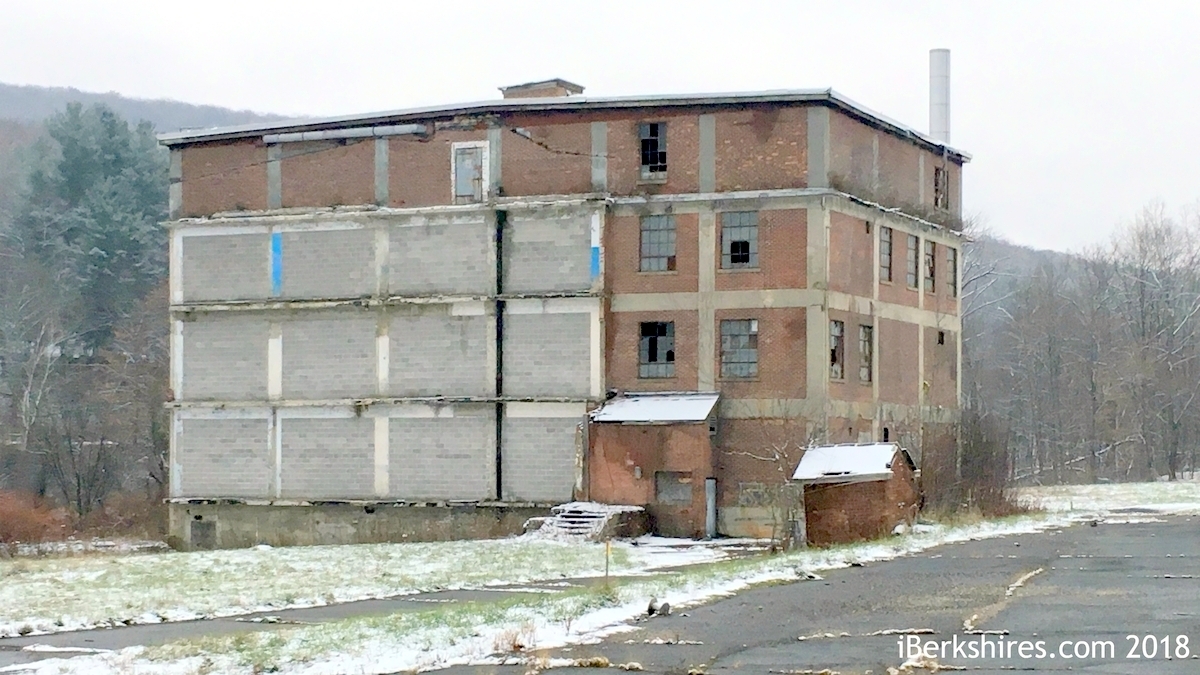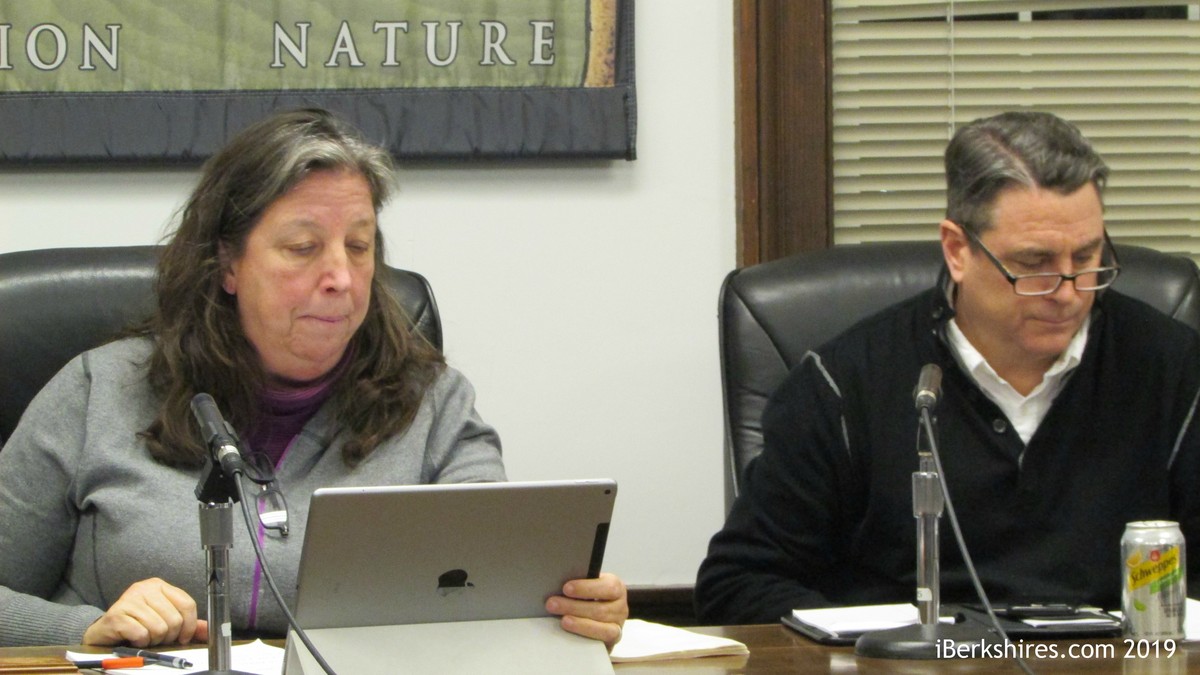Williamstown Community Preservation Committee Hears from ApplicantsBy Stephen Dravis, iBerkshires Staff
01:10AM / Monday, January 28, 2019 | |
 Berkshire Housing Development Corp. is seeking $200,000 in CPA funds toward the $16.1 million development of affordable housing at 330 Cole Ave., the former Photech. Berkshire Housing Development Corp. is seeking $200,000 in CPA funds toward the $16.1 million development of affordable housing at 330 Cole Ave., the former Photech. |

Community Preservation Committee Chair Jane Patton and Joe Finnegan participate in Wednesday's meeting.
WILLIAMSTOWN, Mass. — The nine applicants for Community Preservation Act funds spoke Wednesday in support of their requests before the committee charged with vetting those proposals.
Two of the applicants spoke in support of one another.
"I know another person coming up [in the agenda] is talking about a trail … that trailhead would start at Linear Park," said Amy Jeschawitz, speaking for the Friends of Linear Park. "I think there's synergy between that project and the redo of Linear Park on Water Street. [The trail] would connect two major sections of town-owned property."
Jeschawitz's group is seeking $80,000 of CPA funds toward a $200,000 renovation of the southern portion of Linear Park, off Water Street, where it seeks to, among other things, replace a playground that was dismantled last year after failing a safety inspection.
As she mentioned, Linear Park is also before the Community Preservation Committee this winter in relation to another project: the construction of a walking trail along the Green River to link the southern portion with the northern end, on the other side of Main Street (Route 2).
The Hoosic River Watershed Association is taking the lead on that initiative and pledging $5,000 of its funds against the $20,176 it is requesting from the town.
"Amy [Jeschawitz] referred to this project in her presentation, and I agree with her," HooRWA board member John Case told the CPC. "It works well with the rehabilitation of the Linear Park playground."
Both park proposals fall under the CPA's open space and recreation designation, one of three permissible uses of Community Preservation Act funds. The others, historic preservation and affordable housing, also are represented among the nine proposals before the committee this winter.
Those nine proposals combined total $501,096, ranging from a $200,000 request to support the development of housing at the former Photech mill site on Cole Avenue to $3,980 for the Williamstown Historical Museum to preserve and restore an 18th-century town ledger.
Even accounting for the town's continuing obligation to make payments toward a $1.5 million commitment to the Cable Mills project — a commitment that falls under all three CPA designations — the town still projects $533,318 in available funds for the fiscal 2020 funding cycle.
That means the committee could recommend that May's annual town meeting approve fully funding all nine proposals on the table. But funding them all would pretty much deplete the town's reserves, a reality that was noted by the committee on Wednesday.
"That would pretty much wipe us out," CPC member Peter Mehlin said toward the end of the meeting.
"We bring in about $260,000 a year," said Town Manager Jason Hoch, a voting member of the committee. "We commit about half of that to Cable Mills. So we start each year with new money of about $125,000 plus whatever we bring in from the state. As you know, that's a wildly variable number."
The "state match" is funded through revenues from a surcharge collected by the Registry of Deeds. In 2002, Williamstown was one of the early adopters of the CPA, and its share of the commonwealth's matching funds was much higher; as more municipalities have adopted the act, that share has gone down.
Most of Williamstown's CPA funds are generated from a 2 percent surcharge on property taxes (with the first $100,000 of valuation exempted).
At its Wednesday, Jan. 30, meeting, the CPC may begin deciding how much — if any — of the town's CPA coffers it wants to recommend toward the nine proposals Williamstown received this winter. In theory, the Cable Mills payment meets the town's "statutory commitment" to disperse CPA funds in any given year, and some members of the committee in the past have advocated for making the difficult choice to reject deserving new applications in favor of building up a reserve for a future, unknown, large project.
The largest "ask" before the committee this year arguably is the kind of "big impact" project of which committee members have spoken.
The president of Berkshire Housing Development Corp. was at Town Hall on Wednesday to explain why his agency is seeking $200,000 toward the $16.1 million development of affordable housing at 330 Cole Ave.
Elton Ogden explained that his group has run into higher remediation costs than anticipated at the site and the need to invest more to shore up the "cube" and make it ready to house 22 apartments (the rest of the housing on the site will be in the form of newly constructed townhouses).
Those higher development costs plus cutbacks in the Federal Home Loan Bank program have combined to leave Berkshire Housing with a $1.5 million shortfall in the budget it crafted when it signed a development agreement on the town-owned Cole Avenue property.
Part of the shortfall is being made up by reducing the amount of new construction. Part is coming from Berkshire Housing's decision to defer its development fees.
A $200,000 commitment from the town this year will help demonstrate local commitment to the project and put Berkshire Housing's application over the top when it resubmits to state funders who will award the Low-Income Housing Tax Credits that will make up the bulk of funding for the project, Ogden said.
"We feel optimistic about the application we will submit in February," Ogden said. "[The Massachusetts Department of Housing and Community Development] is familiar with the project. They recognize that Williamstown has made a serious commitment to Affordable Housing. There is no question they'll fund it if we can get over some challenges.
"One challenge made crystal clear by the state is we have to have local funding. Jason [Hoch] and I worked very hard to make a case the town has already given enough. It donated the site, it put tremendous money into Highland Woods and Cable Mills … but DHCD's view is that's not enough. You've got to the CPA, and they feel the town needs to put money in.
"The $200,000 is real money. We really need it. It's going to help us get this thing approved and built. We're hopeful that this time next year we'll be ready to close the deal and start construction."
| 
 MEMBER SIGN IN
MEMBER SIGN IN
 MEMBER SIGN IN
MEMBER SIGN IN